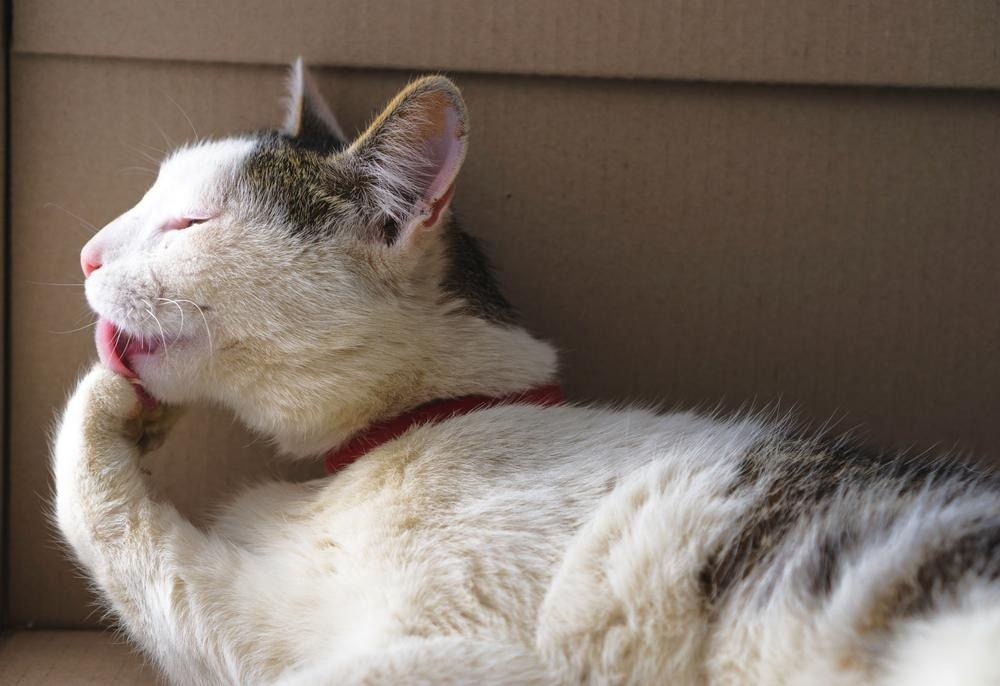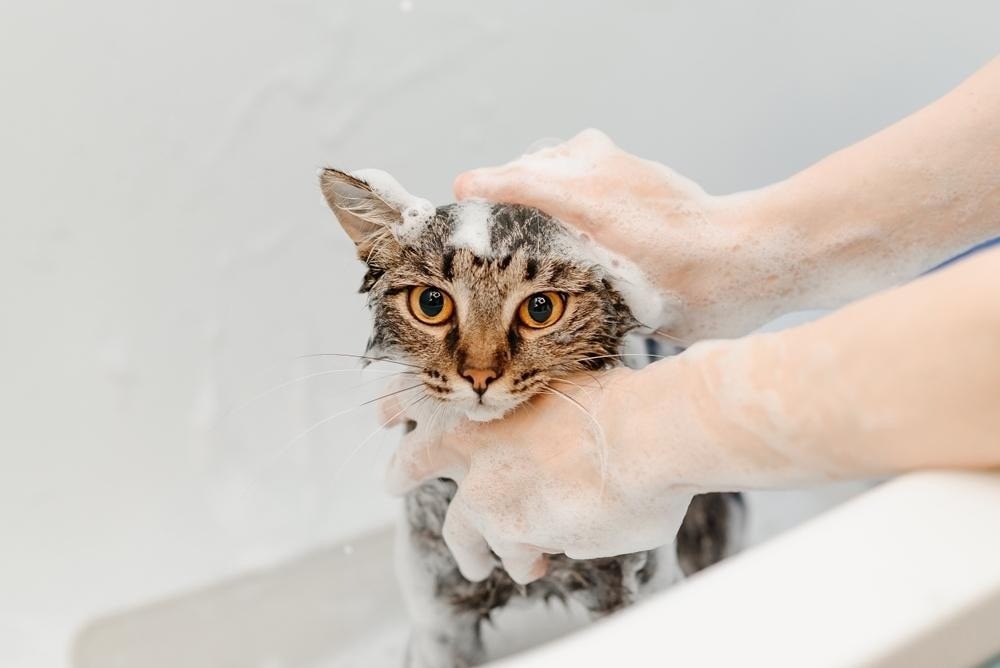

One of the most visible ways to gauge a cat's overall well-being is by examining the health of their coat. Dullness, texture changes, dandruff, or excessive shedding are all signs of an unhealthy cat coat. But often, the coat is not the issue itself, but rather a sign of something else going on. Coat health can offer important clues about a cat's internal health, nutrition, and stress levels.
By paying attention to your cat's skin and coat and being mindful of any changes, you can potentially catch problems early and ensure that your cat stays as healthy and comfortable as possible.
Here's how to tell the difference between a healthy cat coat vs. unhealthy coat, and tips on how to maintain a healthy cat coat.
Types of Cat coat
The type of coat your cat has depends on their breed and age, as well as some environmental factors.
Breed: Long-haired breeds like Himalayans and Maine coons have thick, double coats that require regular grooming to prevent tangles and mats. Short-haired cats, such as domestic shorthair or Siamese cats, have sleek coat that is low-maintenance. Hairless breeds, like the Sphynx, may not have coat, but they still require skin care.
Age: Kittens typically have soft, fluffy coat that changes texture as they grow. Senior cats may develop thinner or coarser coat due to hormonal changes, health conditions and changes in grooming habits.
Environment: Seasonal shedding cycles temporarily cause increased shedding and changes in coat density.
Signs of an Unhealthy Cat Coat
A healthy cat coat should be soft, smooth, and free of dandruff, excessive shedding or bald spots. Call your veterinarian if you notice any of the following signs:
1. Dullness:
Healthy coat has a natural sheen (unless it is a matte breed) and feels soft. Dull, dry or brittle hair is abnormal.
2. Matting:
Matting is common in long-haired cats or those who have stopped grooming due to pain, obesity, or illness. It is a problem because matted coat traps dirt and moisture, which can impact skin health.
3. Patchiness:
Patchy or complete bald spots are always a red flag. Hair loss can be caused by overgrooming, external parasites, allergies, skin infections, external parasites and hormonal imbalances.
4. Oily or greasy coat:
An oily or greasy coat can be a sign that your cat isn't grooming properly. Undergrooming is common in overweight, arthritic or sick cats who don't feel well enough to groom or struggle to reach certain areas. A greasy hair coat can also be caused by sebaceous skin disorders or autoimmune disease.
5. Excessive shedding:
Seasonal shedding is normal, but if your cat is out-of-the-blue leaving coat everywhere or you notice balding or thinning patches, it could be due to stress, parasites, poor nutrition or an underlying health issue.
6. Flaky skin or dandruff:
Dry, flaky skin can be caused by poor grooming, a dry environment, stress, parasites or nutritional deficiencies.
7. Skin odor:
A healthy cat doesn't have a strong smell. Bacterial and yeast infections cause the skin to smell...well...off. If your cat's coat smells bad, musty or unusual (and they didn't get into the trash), then there's likely an underlying issue.
8. Scabs, redness or bumps:
Any irritation, crusting or wounds on the skin are signs that something is amiss. These can be due to a variety of causes, ranging from flea allergies to skin infections to bite wounds. If your cat's coat changes suddenly, or you notice any of the above signs, it's time for a veterinary check-up.

Nutrition and Coat Health
How does nutrition affect cat coat health? Nutrition plays an important role in the health of a cat's skin and coat, more than most people realize. If a cat is healthy and getting the right nutrients, their skin will be supple and their coat will be full, soft and less prone to shedding or dandruff. If they're missing key nutrients, however, you might start seeing problems like dryness, flakiness, dull coat, slow hair regrowth after shaving, or excessive shedding.
Feeding your cat a complete and balanced food that contains high-quality protein and healthy fats helps ensure they're getting the nutrients they need. If your cat's coat seems dull or their skin is dry and flaky, your vet can help you assess their nutrition and may recommend treatment.
Tips for Maintaining a Healthy Cat Coat
In addition to quality nutrition, here are some ways you can help your coatry friend maintain a healthy cat coat:
- Regularly brush your cat to distribute natural oils, reduce shedding and hairballs and prevent matted coat.
- If your cat is overweight, elderly, in pain or sick, help them with grooming regularly.
- If they get dirty or greasy, bathe your cat with a gentle cat shampoo.
- Keep your cat's skin hydrated by keeping their water bowl full of fresh, clean water and by offering wet food. You can also use a water fountain to encourage drinking.
- If you notice sudden changes like itching, hair loss, changes in hair quality or dandruff, talk to your vet.
How often should I bathe my cat?
Most cats are meticulous self-groomers and naturally keep themselves clean. Most cats, especially short-haired ones, rarely need a bath unless they get into something messy or have a skin condition. Long-haired cats can be bathed every 1-3 months, if needed, while hairless breeds may need a gentle bath every 1-2 weeks. Of course, if your cat is elderly, obese or sick, they may need baths more often to keep them comfortable.

What should I do if my cat has dandruff?
Dandruff is the buildup of dead skin flakes on the skin and coat, but it can sometimes be a sign of another underlying problem, so it's best to talk to your vet. To control dandruff, brush your cat regularly, bathe them only when necessary and offer a food that is enriched with omega-6 fatty acids and vitamin E. You can also use a humidifier if you live in a dry environment.
If dandruff comes on suddenly, is getting worse or is accompanied by other signs of skin disease (such as itching, hair loss, red skin, etc.), it's best to schedule a visit to the vet.
Can I bathe my cat with just water?
Yes, you can bathe a cat with just water, but it may not be the best option if they're particularly messy. Water alone is fine if they're only a little dirty, have something on their coat or have sensitive skin or allergies (in which case, it's best to consult your vet). However, if your cat is oily, greasy, or smelly, has external parasites like fleas, has dandruff or a skin condition or if they haven't been grooming themselves, water alone won't cut it.
How often should I brush my cat?
How often you brush your cat depends on the breed:
- Short-haired cats:
1-2x per week - Long-haired cats:
Daily or every other day - Elderly, obese or low-mobility cats:
Brush 2-3x per week - Seasonal shedding (spring and fall):
Brush daily - Hairless cats:
No brushing needed; however, they do need to be wiped down regularly to remove excess skin oil
The condition of your cat's coat is a window into their overall health. Regular grooming, a complete and balanced food and a healthy lifestyle go a long way in keeping your cat healthy. Remember: if your cat's coat is not looking or feeling right, don't ignore it, especially if your cat is acting differently. Reach out to your friendly neighborhood vet to help your cat get back to looking and feeling their best.






















